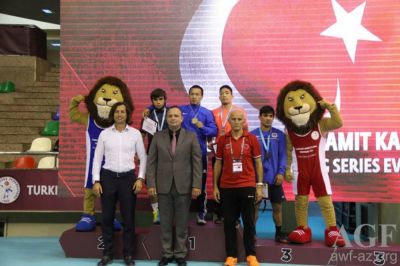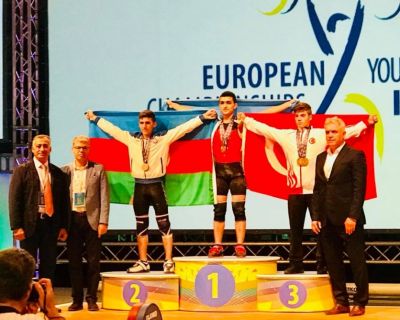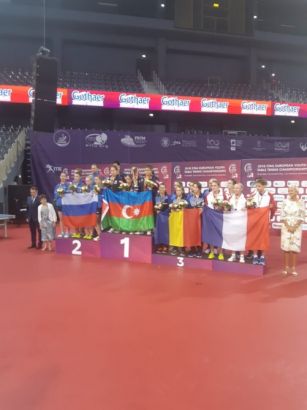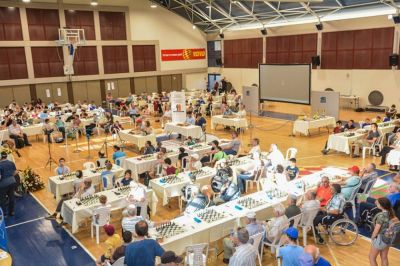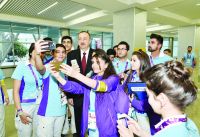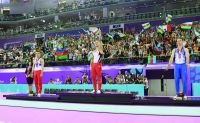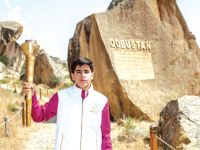Forum brought together 263 representatives from 38 countries, 6 international organizations, as well as 3 Nobel Prize winners, 6 former presidents and adopted Declaration
Baku, October 15 (AzerTAc). As earlier reported, the International Humanitarian Forum under the motto of "XXI century: hopes and challenges" was held in Baku, the capital of the Republic of Azerbaijan on October 10-11, 2011.
The Forum was attended by 263 representatives from 38 countries, including Russia, US, UK, France, Germany, Ukraine, Turkey, Georgia, Egypt, Iran, Pakistan, 6 international organizations, including European Parliament, UNESCO, ISESCO, Organisation of Islamic Cooperation, as well as 3 Nobel Prize winners, 6 former presidents.
The Forum`s plenary meeting brought together 316 scientists, political and public figures.
The Forum was opened on October 10 in Gulustan palace.
President of Azerbaijan Ilham Aliyev made a speech at the Forum.
Then the Forum continued its work with 3 plenary meetings which were addressed by Nobel Prize winners, former presidents and other prominent guests.
On October 11, the Forum continued its work with sessions.
The moderator of the first section meeting on "Multiculturalism in state policy" of the session on "Multiculturalism: achievements and problems" was member-correspondent of the Academy of Sciences of Russia, rector of the Russian State Humanitarian University, president of the Russia-Azerbaijan Society Yefim Pivovar, moderator of the second section meeting on "Multiculturalism in collective consciousness" was director of the Institute for Philosophy, Sociology and Law of the National Academy of Sciences of Azerbaijan, professor Ilham Mammadzade, moderator of the third section meeting on "Multiculturalism in science and philosophy" was former president of Bulgaria Jelyu Jelev.
The "Multiculturalism: achievements and problems" "roundtable meeting" brought together 408 representatives.
The moderator of the first section meeting on "Modern technologies and global disasters" of the session on "Modern technologies that changed the world" was rector of the Moscow State University, academician Victor Sadovnichi, moderator of the second meeting on "Role of modern technologies for integration processes of science and education in the era of globalization" was rector of the Baku State University, academician Abel Maharramov, moderator of the third meeting on "Modern technologies and sustainable development" was president of the Turkish Bilkent University Ali Dogramaci.
The "roundtable meeting" on "Modern technologies that changed the world" was attended by 512 representatives.
Moderator of the first section meeting on "Convergence of sciences and technologies as basis of a new technological pattern" of the session on "Convergence of sciences" was director of Kurchatov Institute National Research Centre Mikhail Kovalchuk, moderator of the second meeting on "From convergence of sciences to convergent technologies" was member- correspondent of the National Academy of Sciences Oleg Naraykin, moderator of the third meeting on "Social and humanitarian aspects of convergence of sciences" was president of the Azerbaijan National Academy of Sciences Mahmud Karimov.
The "roundtable meeting" on "Convergence of sciences" brought together 89 representatives.
Moderator of the first meeting on "Molecular biology" of the session on "Biotechnologies and ethical problems" was academician of the Academy of Sciences of Russia Konstantin Skryabin, moderator of the meeting on "Biotechnologies" was executive director of the Fraunhofer National Biotechnology Center (US) Vidadi Yusibov, moderator of the third meeting on "Ethical problems" was professor of the Pusan National University (The Republic of Korea) Ismayil Zulfuqarov.
"Biotechnologies and ethical problems" "roundtable meeting" brought together 198 representatives.
Moderator of the first section meeting on "Economics with human "face"" of the session on "Humanitarian aspects of economic development models" was rector of the Russian Presidential Academy of National Economy and Public Administration Vladimir Mau, moderator of the second meeting on "Intellectual potential and economic development" was executive director of Azerbaijan State Oil Fund Shahmar Movsumov, moderator of the third meeting on "Social "dimension" of economic development" was rector of Azerbaijan State Economic University, professor Shamsaddin Haciyev.
The "roundtable meeting" on "Humanitarian aspects of economic development models" brought together 382 representatives.
Moderator of the first meeting on "Social journalism in the 21st century: everyone can become a journalist" of the session on "Social journalism and high technologies" was director general of Russia`s ITAR-TASS news agency Vitali Iqnatenko, moderator of the second meeting on "Global media in globalizing space and issues of high-technology integration in information industry" was director general of Turkish Anatolia news agency Kemal Ozturk, moderator of the third meeting on "Social media and politics: integration or popularization?" was AzerTAc`s special correspondent in Germany and Czechia Vugar Seyidov.
Director General of AzerTAc Aslan Aslanov made opening remarks in the session on "Social journalism and high technologies" which brought together 229 representatives. Aslanov made a report on "Multimedia as a New Page in the History of News agencies" in the second meeting.
Moderator of the first meeting on "Universalisation of culture as a problem of globalization" of the session on "Traditional value systems in postmodern culture" was Special Representative of the Russian President for International Cultural Cooperation Mikhail Shvidkoy, moderator of the second meeting on "Rhythms of postmodern culture dynamics" was rector of Azerbaijan University of Languages, professor Samad Seyidov, moderator of the third meeting on "A model of a moral individual in postmodern culture" was professor of the Institute of the Polish Academy of Sciences for Philosophy Cezary Wodziński.
The "roundtable meeting" on "Traditional value systems in postmodern culture" was attended by 352 representatives.
{nl}
x x x
{nl}
All sessions of the Forum culminated in adoption of a Declaration of the Baku International Humanitarian Forum.
The Declaration says:
"We, the participants of Baku International Humanitarian Forum, having held in the capital city of the Azerbaijan Republic, Baku, on 10 - 11 October,2011, being the representatives of politics, science, education and culture,
Following the Millennium Declaration of the United Nations and acknowledging the fact that globalization might acquire its fair nature only through realization of large-scale and persistent efforts on forming common future basing on our common belonging to mankind in all its diversity;
Establishing that in the period of modern world globalization, the system of values is being altered, social and cultural processes are accelerating, spiritual and political changes are occurring causing fundamental changes in all spheres of life, stereotypes and social conceptions, having formed in the community consciousness during the previous historical periods are breaking;
Reminding that the process of globalization, being expanded and intensified, raises the numerous of questions before scientists and politicians including those which mankind have not encountered earlier, and requires forming new humanitarian agenda;
Mentioning that the progress of science, creating and appearing of technologies as well as becoming society informational change a great deal of problems, earlier regarded as merely theoretical, into urgent ones;
Acknowledging the necessity and great importance of the process of comprehension of humanitarian aspects of globalization;
Admitting that we are facing the threats of planet scale on the account of the lack of readiness and ability to live in harmony with the environment;
Taking into consideration the fact that scrutiny of variety of paradigms and options of globalization enables to adequately regard existing the plurality of cultures and valuable orientations;
Emphasizing our conviction that the process of cultures and civilizations interaction in the conditions of globalization does not imply the imposition of certain code of values on all communities;
Admitting the importance of such fundamental values as freedom, equality, solidarity, tolerance, respect to the environment; and simultaneously considering the rightness of the approach when the values of one or a group of countries should not be taken as the solely right; and realizing the necessity to establish certain ethic principles and norms, promoting prevention of civilization division and asserting in rights of global ethic;
Establishing the fact that despite all the attempts of intercultural and intercivilizational dialogue, danger of the conflict of civilizations remains sufficiently urgent.
Taking into account the necessity to attach strong social significance to globalization to ensure efficient and fair results for all;
Sharing the assessments and approaches of the Declaration on social equity for fair globalization with the object of fair globalization;
Having considered in the frame of discussions and broad exchange of opinions the problems as follows:
multiculturalism :achievements and problems;
modern technologies, which transformed the world;
convergence of sciences;
biotechnologies and ethic problems;
humanitarian aspects of economical models of development;
"social" journalism and high technologies
traditional systems of values in postmodernist culture;
We appeal to analyze the achievements and possibilities of multiculturalism as a part of governmental policy of different countries, to ensure a free choice between cultural and ethnic identity, to defend the direct rights and freedom of a human being, resolutely condemn all manifestations of racism, intolerance.
Appreciate the existence of the whole complex of humanitarian problems that should be examined, arousing from modern science and technologies and affirming informational society in its rights;
Consider it necessary to draw attention to the problem of the apprehension of planetary scale disasters, actualization of possibilities of ecological and techno genetic catastrophes, of climate change and natural resources depletion;
Appeal to focus on broad specter of philosophical and ethic problems, having resulted from the great success of biotechnologies;
Express the hope that new technologies will contribute to settle the problems of energy security, healthy food and welfare of the people on the Earth. We appeal to mobilize all efforts to ensure duly development of education in all countries, particularly focusing on the development of high education, the integration of science and education.
Admitting the extraordinary attractiveness of the notion of convergence of sciences and its significance in the formation of new civilization.
Consider that principally new approaches to the comprehension of possibilities of nanotechnologies alongside biotechnologies, informational and cognitive technologies will contribute to prevent natural resources collapse on the Earth by means of creating new technologies as on the pattern of wildlife;
Admitting the plurality of the options of joining global world depending on endemic conditions;
Draw attention to the fact that a human being was and has remained the major subject of the development process and should be regarded in all realized scenarios as the main participant and beneficiary of all paradigms of development;
Believe that in the context of globalization, cultural-civilized approach turned out to be irreplaceable both for the assessment of humanitarian consequences of the realization of economic development paradigms and the assessment of their results;
Regard that high technologies having altered the image of the whole information sphere and having created the phenomenon of social nets, have caused the problem of objective coverage and adequate interpretation of information extremely urgent both in the frame of traditional information agencies and among numerous net information providers;
Mentioning that dramatical development of new tendencies in social journalism being the result of globalization, requires qualified scientific analysis.
Ascertain that East and West insert their values into new forming global normative synthesis; and the future of mankind relies on the understanding of how much the world has become universal;
Admit that forming, as a result of globalization, a new world order is a long-term painful process of changing of world outlook of the humans living in various countries;
Call upon UN, UNESCO and other international structures alongside the states-members of these structures:
To create realistic frames for intercultural, interconfessional and intercivilizational dialogues as the conditions of preserving and further positive development of mankind, exposing for all this first and foremost the common character upon keeping the diversity of cultures and systems of values.
Express our conviction in the necessity of holding out forums of such kind regularly and deeply appreciate all organizers of Baku International Humanitarian Forum, the President and the Government of Azerbaijan for support and hospitality rendered.
Consider it necessary to approve the present declaration and utilize it with the purpose of contribution to the aims of humanitarian cooperation."
{nl}
{nl}
© İstifadə edilərkən "Xalq qəzeti"nə istinad olunmalıdır.





